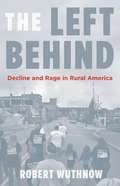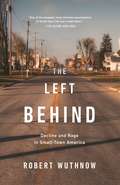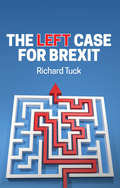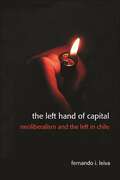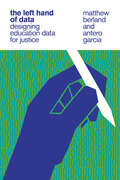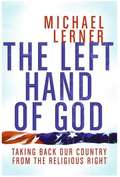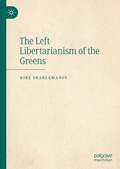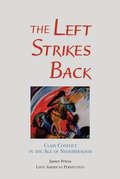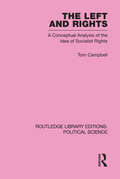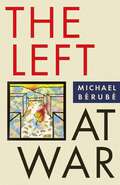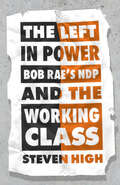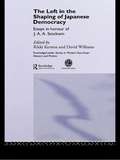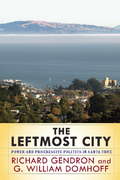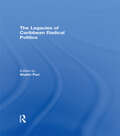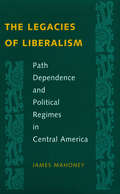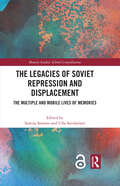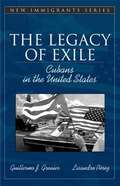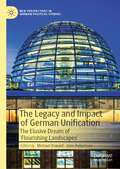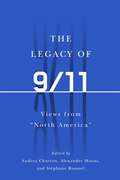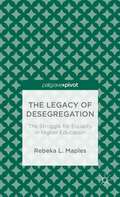- Table View
- List View
The Left Behind: Decline and Rage in Rural America
by Robert WuthnowHow a fraying social fabric is fueling the outrage of rural AmericansWhat is fueling rural America's outrage toward the federal government? Why did rural Americans vote overwhelmingly for Donald Trump? And, beyond economic and demographic decline, is there a more nuanced explanation for the growing rural-urban divide? Drawing on more than a decade of research and hundreds of interviews, Robert Wuthnow brings us into America's small towns, farms, and rural communities to paint a rich portrait of the moral order--the interactions, loyalties, obligations, and identities—underpinning this critical segment of the nation. Wuthnow demonstrates that to truly understand rural Americans' anger, their culture must be explored more fully. We hear from farmers who want government out of their business, factory workers who believe in working hard to support their families, town managers who find the federal government unresponsive to their communities' needs, and clergy who say the moral climate is being undermined. Wuthnow argues that rural America's fury stems less from specific economic concerns than from the perception that Washington is distant from and yet threatening to the social fabric of small towns. Rural dwellers are especially troubled by Washington's seeming lack of empathy for such small-town norms as personal responsibility, frugality, cooperation, and common sense. Wuthnow also shows that while these communities may not be as discriminatory as critics claim, racism and misogyny remain embedded in rural patterns of life.Moving beyond simplistic depictions of the residents of America's heartland, The Left Behind offers a clearer picture of how this important population will influence the nation's political future.
The Left Behind: Decline and Rage in Small-Town America
by Robert WuthnowHow a fraying social fabric is fueling the outrage of rural AmericansWhat is fueling rural America’s outrage toward the federal government? Why did rural Americans vote overwhelmingly for Donald Trump? And is there a more nuanced explanation for the growing rural-urban divide? Drawing on more than a decade of research and hundreds of interviews, Robert Wuthnow brings us into America’s small towns, farms, and rural communities to paint a rich portrait of the moral order—the interactions, loyalties, obligations, and identities—underpinning this critical segment of the nation. Wuthnow demonstrates that to truly understand rural Americans’ anger, their culture must be explored more fully, and he shows that rural America’s fury stems less from economic concerns than from the perception that Washington is distant from and yet threatening to the social fabric of small towns. Moving beyond simplistic depictions of America’s heartland, The Left Behind offers a clearer picture of how this important population will influence the nation’s political future.
The Left Case for Brexit: Reflections on the Current Crisis
by Richard TuckLiberal left orthodoxy holds that Brexit is a disastrous coup, orchestrated by the hard right and fuelled by xenophobia, which will break up the Union and turn what’s left of Britain into a neoliberal dystopia. Richard Tuck’s ongoing commentary on the Brexit crisis demolishes this narrative. He argues that by opposing Brexit and throwing its lot in with a liberal constitutional order tailor-made for the interests of global capitalists, the Left has made a major error. It has tied itself into a framework designed to frustrate its own radical policies. Brexit therefore actually represents a golden opportunity for socialists to implement the kind of economic agenda they have long since advocated. Sadly, however, many of them have lost faith in the kind of popular revolution that the majoritarian British constitution is peculiarly well-placed to deliver and have succumbed instead to defeatism and the cultural politics of virtue-signalling. Another approach is, however, still possible. Combining brilliant contemporary political insights with a profound grasp of the ironies of modern history, this book is essential for anyone who wants a clear-sighted assessment of the momentous underlying issues brought to the surface by Brexit.
The Left Hand of Capital: Neoliberalism and the Left in Chile
by Fernando Ignacio LeivaIn The Left Hand of Capital, Fernando Ignacio Leiva provides a theoretically grounded analysis of the last thirty years of socioeconomic policies in Chile, beginning at the end of the Pinochet military regime in 1990. He skillfully probes how innovative center-left politico-economic initiatives transformed the state's relationships with the country's urban poor, indigenous peoples, workers, students, and business elites, thereby contributing to institutionalize, legitimize, and renew Chile's neoliberal system of domination. Leiva documents how such politics, progressive in appearance, were pivotal in forging new arts of domestication, "participatory" social control mechanisms, and commodified subjectivities. This landmark book guides us into a deeper awareness about the limitations of center-left politics, not only in Chile, but elsewhere in the Americas and Western Europe as well. At a time when far-right movements seem to be growing in the Global South, Europe, and the United States, this book offers valuable insights into the predicament of social democracy and how, as in Chile and in the context of global neoliberalism, it can become the "left hand of capital."
The Left Hand of Data: Designing Education Data for Justice
by Antero Garcia Matthew BerlandA speculative framework that imagines how we can use education data to promote play, creativity, and social justice over normativity and conformity.Educational analytics tend toward aggregation, asking what a &“normative&” learner does. In The Left Hand of Data, educational researchers Matthew Berland and Antero Garcia start from a different assumption—that outliers are, and must be treated as, valued individuals. Berland and Garcia argue that the aim of analytics should not be about enforcing and entrenching norms but about using data science to break new ground and enable play and creativity. From this speculative vantage point, they ask how we can go about living alongside data in a better way, in a more just way, while also building on the existing technologies and our knowledge of the present.The Left Hand of Data explores the many ways in which we use data to shape the possible futures of young people—in schools, in informal learning environments, in colleges, in libraries, and with educational games. It considers the processes by which students are sorted, labeled, categorized, and intervened upon using the bevy of data extracted and collected from individuals and groups, anonymously or identifiably. When, how, and with what biases are these data collected and utilized? What decisions must educational researchers make around data in an era of high-stakes assessment, surveillance, and rising inequities tied to race, class, gender, and other intersectional factors? How are these complex considerations around data changing in the rapidly evolving world of machine learning, AI, and emerging fields of educational data science? The surprising answers the authors discover in their research make clear that we do not need to wait for a hazy tomorrow to do better today.
The Left Hand of God
by Michael LernerThe unholy alliance of the Political Right and the Religious Right threatens to destroy the America we love. It also threatens to generate a popular aversion to God and religion by identifying religious values with a pro-war, pro-business, pro-rich, anti-science, and anti-environmental stance. Over the past few decades, the Republicans have achieved political dominance by forging a union with the Religious Right. This marriage has provided a sanctimonious veneer for policies that have helped the rich get richer while ignoring the needs of the middle class and the poor, dismantling environmental and civil liberties protections, and seeking global domination. The Right champions the materialism and ruthless selfishness promoted by unrestrained capitalism and then laments the moral crises of family instability and loneliness experienced by people who bring these commercial values into their homes and personal lives. In response, the Religious Right offers insular communities for the faithful and a culture that blames liberals, activist judges, homosexuals, independent women, and all secular people for the moral and spiritual emptiness so many Americans experience. Yet, however distorted both the Right's analysis and its solutions to America's spiritual crisis may be, it wins allegiance by addressing the human hunger for a life with some higher purpose. The Left, by contrast, remains largely tone-deaf to the spiritual needs of the American people. It is the yearning for meaning in life, not just the desire for money or power, that lies at the core of American politics. Addressing the central mystery of contemporary politics -- why so many Americans vote against their own economic interests -- The Left Hand of God provides an invaluable, timely, and blunt critique of the current state of faith in government. Lerner challenges the Left to give up its deeply held fear of religion and to distinguish between a domination-oriented, Right-Hand-of-God tradition and a more compassionate and hope-oriented Left-Hand-of-God worldview. Further, Lerner describes the ways that Democrats have misunderstood and alienated significant parts of their potential constituency. To succeed again, Lerner argues, the Democratic Party must rethink its relationship to God, champion a progressive spiritual vision, reject the old bottom line that promotes the globalization of selfishness, and deal head-on with the very real spiritual crisis that many Americans experience every day. Lerner presents a vision that incorporates and then goes far beyond contemporary liberal and progressive politics. He argues for a new bottom line in our economy, schools, and government. This is a fundamentally fresh approach, one that takes spiritual needs seriously in our economic and political lives. Presenting an eight-point progressive spiritual covenant with America, Lerner provides a blueprint for how the Democratic Party can effectively challenge the Right and position itself to win the White House and Congress. By appealing to religious, secular, and spiritual but not necessarily religious people, The Left Hand of God blazes a trail that could change our world and reclaim America from the Religious Right.
The Left Libertarianism of the Greens
by Kire SharlamanovThis book offers a systematic and multifaceted analysis of the Greens on the levels of political philosophy, political concepts, social movement, political parties, and political ideology. The originality of the book lies in the determination of the political philosophy of the Greens as left libertarianism. Such a determination of the Greens can already be found in the writings of Herbert Kitschelt, but while he only makes a cursory mention of it, this book offers a detailed elaboration of the points of contact between left-libertarianism and the Greens. The book also attempts to explain the acceptance of left-libertarianism by the Greens with social processes in Western Europe, the emergence of a new middle class and post-materialist values. At the same time, the book examines the relationship between the left-libertarian political philosophy of the Greens and the organizational structure of the Green parties, their relationship to the state, and to democracy.
The Left Strikes Back: Class Conflict In Latin America In The Age Of Neoliberalism (Latin American Perspectives Ser.)
by James PetrasThe Left Strikes Back addresses the neglected topic of popular resistance to capital globalization and neoliberal polices, and considers the future of the revolutionary left in this region. James Petras shows that the current stage of capital globalization and the weakening of the ability of established popular groups to defend themselves have generated an important organized response on the part of those whose standard of living is most undermined and threatened by the process. The book argues convincingly that we can now see the emerging forms of resistance in new, popular organizations that, while frequently local and provincial, nevertheless have developed an international consciousness. By discussing their spatial-economic focus, social base, style of political action, and political perspective, The Left Strikes Back both identifies and differentiates the different waves of the left. Further, it presents data documenting the growth, contradictions, and political challenges that confront these burgeoning socio-political movements.
The Left Unraveled: Social Democracy & the New Left Challenge in Britain & West Germany
by Thomas A. KoelbleIn the early 1980s both the British Labour Party and the West German Social Democrats (SPD), confronted with serious internal challenges from the political left, experienced an erosion of support that resulted in the emergence of new political parties--the British Social Democratic Party and the West German Green Party. Explicitly comparative, this study presents a theoretically innovative analysis while offering a sophisticated understanding of the political confrontations between social democrats, the new left, traditional socialists, and trade unionists in both Britain and West Germany.By focusing on the established parties rather than on external developments, Koelble departs from conventional methodology regarding the fortunes of political parties. In examining the fundamental processes of decision making and coalition building within the SPD and the Labour Party, he argues that it is the organizational structures within parties that shape political results by setting limits, creating opportunities, and determining strategies.
The Left and Rights: A Conceptual Analysis of the Idea of Socialist Rights (Routledge Library Editions: Political Science #50)
by Tom CampbellThe book presents an analysis of the concept of rights and provides an illuminating expression of socialist ideals. The author outlines an analysis of fundamental human rights compatible with historical relativism and applies this to the political right of freedom of expression and the economic right to work. Finally he deploys the proposed analysis of socialist rights to explain the ambivalence of socialist thinkers towards welfare rights in contemporary capitalist states and to analyze the logic of assertions that welfare law is often counter-productive.
The Left at War (Cultural Front)
by Michael BérubéThe terrorist attacks of 9/11 and Bush’s belligerent response fractured the American left—partly by putting pressure on little-noticed fissures that had appeared a decade earlier.In a masterful survey of the post-9/11 landscape, renowned scholar Michael Bérubé revisits and reinterprets the major intellectual debates and key players of the last two decades, covering the terrain of left debates in the United States over foreign policy from the Balkans to 9/11 to Iraq, and over domestic policy from the culture wars of the 1990s to the question of what (if anything) is the matter with Kansas.The Left at War brings the history of cultural studies to bear on the present crisis—a history now trivialized to the point at which few left intellectuals have any sense that merely "cultural" studies could have something substantial to offer to the world of international relations, debates over sovereignty and humanitarian intervention, matters of war and peace. The surprising results of Bérubé’s arguments reveal an American left that is overly fond of a form of "countercultural" politics in which popular success is understood as a sign of political failure and political marginality is understood as a sign of moral virtue. The Left at War insists that, in contrast to American countercultural traditions, the geopolitical history of cultural studies has much to teach us about internationalism—for "in order to think globally, we need to think culturally, and in order to understand cultural conflict, we need to think globally." At a time when America finds itself at a critical crossroads, The Left at War is an indispensable guide to the divisions that have created a left at war with itself.
The Left in Power: Bob Rae’s NDP and the Working Class
by Steven HighAt the end of the twentieth century, as social democratic parties around the world struggled to produce a coherent response to the deindustrialization crisis, many pivoted towards progressive neoliberalism and Third Way social democracy. Almost everywhere, they turned their backs on the weakened trade union movement and embraced neoliberal assumptions about labour force flexibility and global competition. Shamefully, Third Way social democrats emphasized the moral dimension of poverty rather than its structural causes as they abandoned the old redistributive class politics of the Left. Based on extensive archival research and interviews with NDP politicians, senior economic policy advisors, and trade unionists, The Left in Power examines the response of the political Left in Ontario to the crisis that gripped the old ‘industrialized world.’ Steven High revisits the heartbreaking years of Bob Rae’s Ontario NDP government—from their historic and unexpected 1990 victory, to their policy shifts that left working-class voters feeling betrayed, to their landslide defeat in 1995—to uncover what we can learn from one social democratic party’s mistakes about how to govern from the Left.
The Left in the Shaping of Japanese Democracy: Essays in Honour of J.A.A. Stockwin (Routledge/Leiden Series in Modern East Asian Politics, History and Media #Vol. 2)
by David Williams Rikki KerstenLeftist thought and activism stands as a defining force in the articulation of political culture and policy in modern Japan. Operating from the periphery of formal political power for the most part, the Japanese Left has had an impact that extends far beyond its limited success at the ballot box. The essays that compose this Oxford Festschrift range over a wide set of themes including the tragic careers of two prewar left-wing martyrs (Goto-Jones); Hisashi Asô, the great Socialist apostate (Kersten); the Left’s evasion of constitutional sovereignty (Williams); the rise and fall of Nikkyô-sô (Aspinall); the Left’s impact on privatization and bureaucratic reform (Nakano); the demise of parliamentary Socialism (Hyde); the Left’s recent embrace of free market principles (Schoppa); critical Japan studies and American empire since ‘9.11’ (Williams); and history’s final judgment on the fate of this great political movement (Banno).
The Leftmost City
by G. William Domhoff Richard GendronAlmost all US cities are controlled by real estate and development interests, but Santa Cruz, California, is a deviant case. An unusual coalition of socialist-feminists, environmentalists, social-welfare liberals, and neighborhood activists has stopped every growth project proposed by landowners and developers since 1969, and controlled the city council since 1981. Even after a 1989 earthquake forced the city to rebuild its entire downtown, the progressive elected officials prevailed over developers and landowners. Drawing on hundreds of primary documents, as well as original, previously unpublished interviews, The Leftmost City utilizes an extended case study of Santa Cruz to critique three major theories of urban power: Marxism, public-choice theory, and regime theory. Santa Cruz is presented within the context of other progressive attempts to shape city government, and the authors' findings support growth-coalition theory, which stresses the conflict between real estate interests and neighborhoods as the fundamental axis of urban politics. The authors conclude their analysis by applying insights gleaned from Santa Cruz to progressive movements nationwide, offering a template for progressive coalitions to effectively organize to achieve political power.
The Leftmost City
by G. William Domhoff Richard GendronAlmost all US cities are controlled by real estate and development interests, but Santa Cruz, California, is a deviant case. An unusual coalition of socialist-feminists, environmentalists, social-welfare liberals, and neighborhood activists has stopped every growth project proposed by landowners and developers since 1969, and controlled the city council since 1981. Even after a 1989 earthquake forced the city to rebuild its entire downtown, the progressive elected officials prevailed over developers and landowners. Drawing on hundreds of primary documents, as well as original, previously unpublished interviews, The Leftmost City utilizes an extended case study of Santa Cruz to critique three major theories of urban power: Marxism, public-choice theory, and regime theory. Santa Cruz is presented within the context of other progressive attempts to shape city government, and the authors' findings support growth-coalition theory, which stresses the conflict between real estate interests and neighborhoods as the fundamental axis of urban politics. The authors conclude their analysis by applying insights gleaned from Santa Cruz to progressive movements nationwide, offering a template for progressive coalitions to effectively organize to achieve political power.
The Leftmost City: Power and Progressive Politics in Santa Cruz
by G. William Domhoff Richard GendronAlmost all US cities are controlled by real estate and development interests, but Santa Cruz, California, is a deviant case. An unusual coalition of socialist-feminists, environmentalists, social-welfare liberals, and neighborhood activists has stopped every growth project proposed by landowners and developers since 1969, and controlled the city council since 1981. Even after a 1989 earthquake forced the city to rebuild its entire downtown, the progressive elected officials prevailed over developers and landowners. Drawing on hundreds of primary documents, as well as original, previously unpublished interviews,The Leftmost Cityutilizes an extended case study of Santa Cruz to critique three major theories of urban power: Marxism, public-choice theory, and regime theory. Santa Cruz is presented within the context of other progressive attempts to shape city government, and the authors' findings support growth-coalition theory, which stresses the conflict between real estate interests and neighborhoods as the fundamental axis of urban politics. The authors conclude their analysis by applying insights gleaned from Santa Cruz to progressive movements nationwide, offering a template for progressive coalitions to effectively organize to achieve political power.
The Leftmost City: Power and Progressive Politics in Santa Cruz
by G. William Domhoff Richard GendronAlmost all US cities are controlled by real estate and development interests, but Santa Cruz, California, is a deviant case. An unusual coalition of socialist-feminists, environmentalists, social-welfare liberals, and neighborhood activists has stopped every growth project proposed by landowners and developers since 1969, and controlled the city council since 1981. Even after a 1989 earthquake forced the city to rebuild its entire downtown, the progressive elected officials prevailed over developers and landowners. Drawing on hundreds of primary documents, as well as original, previously unpublished interviews, The Leftmost City utilizes an extended case study of Santa Cruz to critique three major theories of urban power: Marxism, public-choice theory, and regime theory. Santa Cruz is presented within the context of other progressive attempts to shape city government, and the authors' findings support growth-coalition theory, which stresses the conflict between real estate interests and neighborhoods as the fundamental axis of urban politics. The authors conclude their analysis by applying insights gleaned from Santa Cruz to progressive movements nationwide, offering a template for progressive coalitions to effectively organize to achieve political power.
The Legacies of Caribbean Radical Politics
by Shalini PuriThe year 2009 marked the 50th anniversary of the Cuban Revolution and the thirtieth anniversary of the Grenadian and Nicaraguan Revolutions, and as such offered an occasion to assess the complex legacies of revolutionary politics in the Caribbean. This volume considers what we might learn from such revolutionary projects and their afterlives, from their successes and their errors. It explores what struggles, currently underway in the Caribbean, share with these earlier and longer revolutionary traditions, and how they depart from them. It analyzes radical movements in Jamaica, Grenada, Cuba, Venezuela, Guadeloupe, Suriname, and Guyana, not only in their national dimensions, but in terms of their regional linkages and mutual influences.The chapters are drawn from various disciplines and a range of democratic leftist projects. They consider not only state and party politics, but also civil society, cultural politics and artistic production, strikes, and grassroots activism.This book was published as a special issue of Interventions: International Journal of Postcolonial Studies.
The Legacies of Liberalism: Path Dependence and Political Regimes in Central America
by James MahoneyWinner of the Barrington Moore Jr. Prize for the Best Book in Comparative and Historical Sociology from the American Sociological AssociationWinner of the Best Book Award in the Comparative Democratization Section from the American Political Science AssociationDespite their many similarities, Central American countries during the twentieth century were characterized by remarkably different political regimes. In a comparative analysis of Guatemala, El Salvador, Costa Rica, Honduras, and Nicaragua, James Mahoney argues that these political differences were legacies of the nineteenth-century liberal reform period. Presenting a theory of "path dependence," Mahoney shows how choices made at crucial turning points in Central American history established certain directions of change and foreclosed others to shape long-term development. By the middle of the twentieth century, three types of political regimes characterized the five nations considered in this study: military-authoritarian (Guatemala, El Salvador), liberal democratic (Costa Rica), and traditional dictatorial (Honduras, Nicaragua). As Mahoney shows, each type is the end point of choices regarding state and agrarian development made by these countries early in the nineteenth century. Applying his conclusions to present-day attempts at market creation in a neoliberal era, Mahoney warns that overzealous pursuit of market creation can have severely negative long-term political consequences.The Legacies of Liberalism presents new insight into the role of leadership in political development, the place of domestic politics in the analysis of foreign intervention, and the role of the state in the creation of early capitalism. The book offers a general theoretical framework that will be of broad interest to scholars of comparative politics and political development, and its overall argument will stir debate among historians of particular Central American countries.
The Legacies of Soviet Repression and Displacement: The Multiple and Mobile Lives of Memories (Memory Studies: Global Constellations)
by Samira Saramo Ulla SavolainenThis book explores the ways in which memories of Stalin-era repression and displacement manifest across times and places through diverse forms of materialization. The chapters of the book explore the concrete mobilities of life stories, letters, memoirs, literature, objects, and bodies reflecting Soviet repression and violence across borders of geographical locations, historical periods, and affective landscapes. These spatial, temporal, and psychological shifts are explored further as processes of textual circulation and mediation. By offering novel multi-sited and multi-media analyses of the creative, political, societal, cultural, and intimate implications of remembrance, the collection contributes fresh interdisciplinary perspectives to both the field of memory studies and the study of Soviet repression. The case studies in this collection focus on the personal, autobiographical, and intimate representations, experiences, and practices related to the remembrance of Stalinist repression and displacement as they are mediated through memoirs, fiction, interviews, and versatile commemorative practices. Taken together, the book asks: what happens to memories, life stories, testimonies, and experiences when they travel in time and space and between media and are (re)interpreted and (re)formulated through these transfers? What kinds of memorial forms are gained through processes of mediation? What types of spaces for remembering, telling, and feeling are created, negotiated, and contested through these shifts? What are the boundaries and intersections of intimate, familial, community, national, and transnational memories? By analytically contextualizing the various case studies within broader memory discourses in a range of geographical and political contexts, the book offers rich and multilayered interpretations of the enduring ramifications of communist repression. The collection demonstrates that these multiply moving memories not only reflect Eastern European memory culture but also reach far beyond and have transnational and transgenerational significance. As such, this timely book will be essential reading for anyone with an interest in the former Soviet Union or memory studies more broadly.
The Legacies of Totalitarianism
by Aviezer TuckerThe first political theory of post-Communism examines its implications for understanding liberty, rights, transitional justice, property rights, privatization, rule of law, centrally planned public institutions, and the legacies of totalitarian thought in language and discourse. The transition to post-totalitarianism was the spontaneous adjustment of the rights of the late-totalitarian elite to its interest. Post-totalitarian governments faced severe scarcity in the supply of justice. Rough justice punished the perpetrators and compensated their victims. Historical theories of property rights became radical, and consequentialist theories, conservative. Totalitarianism in Europe disintegrated but did not end. The legacies of totalitarianism in higher education met New Public Management, totalitarian central planning under a new label. Totalitarianism divorced language from reality through the use of dialectics that identified opposites and the use of logical fallacies to argue for ideological conclusions. This book illustrates these legacies in the writings of Habermas, Derrida, and Žižek about democracy, personal responsibility, dissidence, and totalitarianism.
The Legacy Of Exile: Cubans In The United States (New Immigrants)
by Nancy Foner Lisandro Pérez Guillermo J. GrenierThe Legacy of Exile , the latest entry in the New Immigrants Series, deals with one of the most visible and political of all U.S. immigrant groups–Cubans. <p><p> This is a group that was welcomed to the United States, that transformed a major U.S. metropolitan area, that exerts a powerful–and controversial–impact on U.S. foreign policy, and that has achieved, in a relatively short time, economic success in this country. The theme of the book is that the Cuban presence has been shaped by the experience of exile. <p> In understanding the case of the Cuban immigration to the United States, students will gain insight into the dynamics of U.S. immigration policy; the differences between immigrants and exiles; interethnic relations among newcomers and established residents; and the economic development of immigrant communities. Cuban immigrants provide a surprising and compelling case study of the relatively successful adaptation of an immigrant community. <p> The book presents the long tradition of Cuban immigration to the United States; the elements of Cuban culture which have emerged and reinforced this tradition of migration; the impact that Cubans have had on the Miami area; as well as the changes within the community as Cubans develop into a well established minority group within the United States.
The Legacy and Impact of German Unification: The Elusive Dream of 'Flourishing Landscapes' (New Perspectives in German Political Studies)
by John Robertson Michael OswaldOn October 3, 1990 the future of both Europe and Germany became powerfully and inexorably intertwined across a politically broadened continent powering transformative social, political and economic interactions. The thirty year mark after the then reigning chancellor Helmut Kohl promised 'flourishing landscapes' in the former GDR is more than just a new anniversary from which mandatory reflections must follow. Arguably, it represents a temporal boundary between the adjustments and reactions conditioned and captivated by a sense of something new and uncertain, and that point moving forward from which unification’s legacy inescapably tethers Germany’s future to normal politics shaped by the issues of the moment, and not politics gripped by the debates of unification itself. That legacy is defined by an accumulation over thirty years of adjustments, mutations, counter-adjustments and strategic reactions which have now delivered through the many ripples of change a Germany managing the course-trajectory which unification has relentlessly plotted. The foreseeable future will certainly see that legacy of unification tenaciously continue to project yet shrouded within the background of Germany’s routine politics. This volume explores that legacy within the post-unification era and reflects on the way forward into a near-term German future no longer consumed with unification itself but with the reality of politics it has steadily defined.
The Legacy of 9/11: Views from North America
by Andrea Charron, Alexander Moens & Stéphane RousselWhile 9/11 was understood at the time as a world-changing event in international relations, its uneven aftermath and the long-term effects for North America could not have been predicted. Twenty years later, The Legacy of 9/11 explores the political, economic, security and defence, and trade and border implications of the event. Written by a team of North American experts across many fields, the book foregrounds the fallout of 9/11 in Mexico and Canada as opposed to the more commonly discussed impact on the United States. Looking at the event and its aftermath through four lenses – ideas about North America; border, trade, and economics; security and society; and defence – contributors analyze the complex legacy of 9/11. Rather than serving as a catalyst to create an integrated, trilateral continent, 9/11 entrenched the North America we have today: three separate states with emphasis on two very different borders.From a reconsideration of internationalism, a rise in populism, and a shift in migration patterns to the interventions in Afghanistan and Iraq, The Legacy of 9/11 uncovers how successive North American governments reacted in surprising ways to the world-altering attack.
The Legacy of Desegregation: The Struggle for Equality in Higher Education
by Rebeka L. MaplesThe book analyzes the struggle of African Americans to gain access and equity in higher education in the United States. It chronicles some of the history prior to court ordered segregation and traces the mandate to desegregate by following the Adams v. Richardson (1973) case, which ordered the dismantling of dual systems of higher education.
